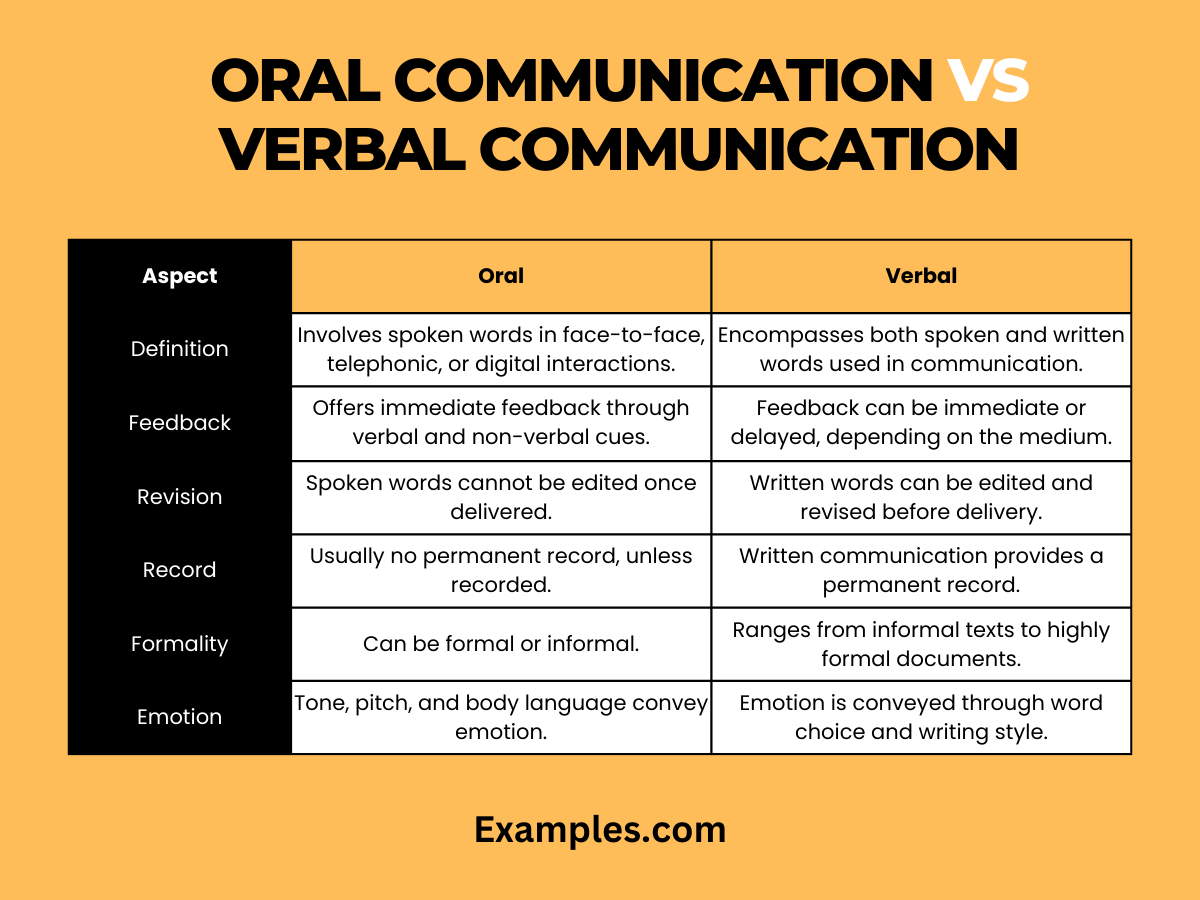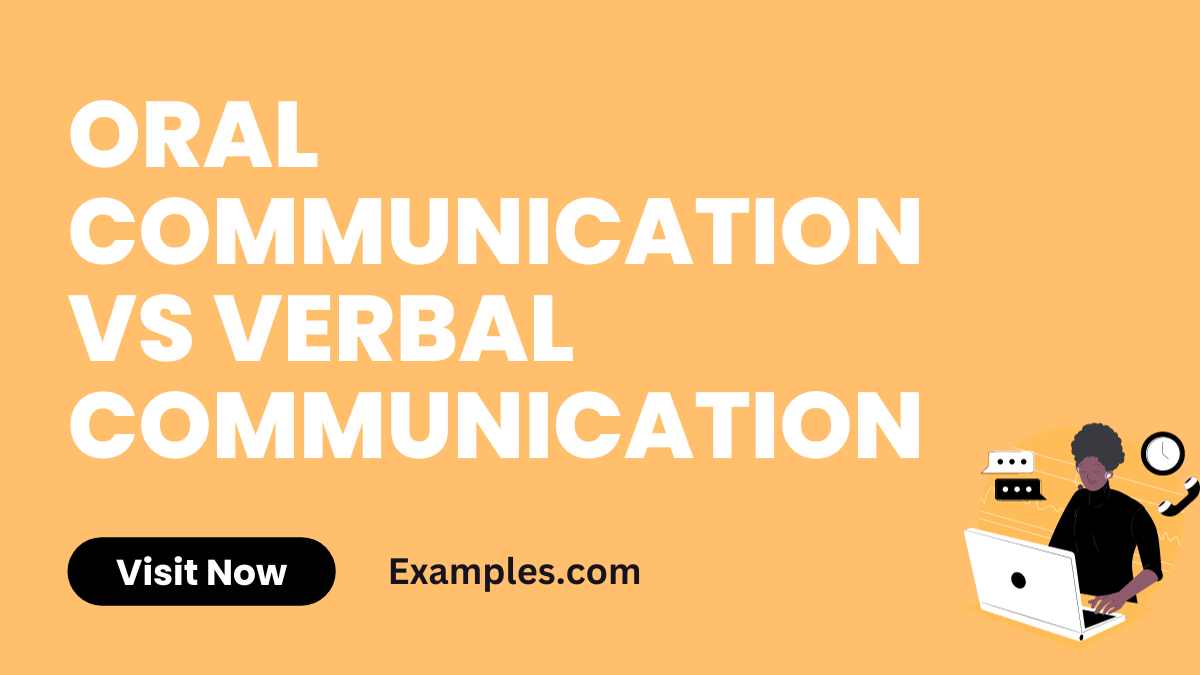Oral Communication vs Verbal Communication – 9+ Examples
In the realm of effective communication, understanding the subtleties between oral and verbal communication is key. This guide illuminates these differences with practical insights and communication examples. While both forms are integral to interpersonal interactions, each serves distinct purposes and requires specific skills. Discover how to harness these forms of communication to convey your messages more effectively, whether in personal conversations, professional meetings, or public speaking scenarios.
Differences between Oral Communication vs Verbal Communication

| Aspect | Oral Communication | Verbal Communication |
|---|---|---|
| Definition | Involves spoken words in face-to-face, telephonic, or digital interactions. | Encompasses both spoken and written words used in communication. |
| Feedback | Offers immediate feedback through verbal and non-verbal cues. | Feedback can be immediate or delayed, depending on the medium. |
| Revision | Spoken words cannot be edited once delivered. | Written words can be edited and revised before delivery. |
| Record | Usually no permanent record, unless recorded. | Written communication provides a permanent record. |
| Formality | Can be formal or informal. | Ranges from informal texts to highly formal documents. |
| Emotion | Tone, pitch, and body language convey emotion. | Emotion is conveyed through word choice and writing style. |
| Clarity | Dependent on the speaker’s clarity and articulation. | Clarity achieved through careful wording and structure. |
| Scope | Often used for immediate, interpersonal communication. | Used in both immediate and long-range communication. |
| Examples | Conversations, speeches, phone calls. | Emails, reports, letters, texts. |
10 Oral Communication Examples
Oral communication skills are essential for effective face-to-face interactions, whether in personal conversations or professional presentations. These skills involve a range of techniques, from clarity in speech to effective non-verbal cues, crucial for conveying your message effectively and engagingly. Below are 10 key oral communication skills, each illustrated with a unique example.
- Articulation: Speaking clearly to ensure your message is understood.
Example: “We need to meet the project deadline by next Friday.” - Tone Modulation: Varying your tone to emphasize important points.
Example: Stressing certain words for impact, “This is our top priority.” - Active Listening: Paying full attention to the speaker.
Example: Nodding and saying, “I see, please continue with your thoughts.”

- Body Language: Using gestures to complement your words.
Example: Smiling and maintaining eye contact while greeting a colleague. - Clarity: Ensuring your message is clear and concise.
Example: “The goal is to increase sales by 15% this quarter.” - Empathy: Showing understanding and concern in your communication.
Example: “I understand why this situation is frustrating for you.” - Confidence: Speaking assertively to convey your message.
Example: “I am confident that our approach will be successful.” - Feedback: Giving and receiving feedback effectively.
Example: “Your input on this matter would be greatly appreciated.” - Adaptability: Adjusting your communication style to your audience.
Example: Using simpler terms when explaining technical issues to non-experts. - Persuasion: Convincingly presenting your ideas.
Example: “Adopting this strategy will benefit us in numerous ways.”
10 Verbal Communication Examples
Verbal communication encompasses the words we choose to convey our thoughts, feelings, and intentions. These skills are crucial for effective communication in both personal and professional settings. Here are 10 essential verbal communication skills, each with a distinct example.
- Word Choice: Selecting the right words for clarity and impact.
Example: “Our team exhibited exceptional performance this quarter.” - Listening for Understanding: Truly understanding the speaker’s message.
Example: “If I’m hearing you correctly, you’re suggesting…” - Expressing Empathy Verbally: Conveying understanding through words.
Example: “I can imagine how challenging this is for you.” - Asking Questions: Using questions to gain more information.
Example: “What steps do you think we should take next?”

- Summarizing: Concisely restating the main points.
Example: “To summarize, our focus will be on market expansion.” - Clarifying: Asking for or providing clarity.
Example: “Could you elaborate on your last point?” - Positive Language: Using words that convey positivity.
Example: “We have a great opportunity to improve here.” - Conciseness: Being brief yet comprehensive in your speech.
Example: “In short, we need to revamp our marketing strategy.” - Assertiveness: Clearly stating your position or needs.
Example: “I believe we must reconsider our approach to this project.” - Constructive Criticism: Offering feedback in a helpful manner.
Example: “I suggest revising this section for greater clarity.”
Each example demonstrates how to effectively use oral and verbal communication skills in various contexts, enhancing the quality of interactions and ensuring your message is conveyed as intended.
Importance of Oral Communication and Verbal Communication
Both oral and verbal communication play pivotal roles in effective interactions. Here are ten points highlighting their importance:
- Adaptability: Oral communication allows for immediate adaptation based on feedback, while verbal communication in writing can be tailored to different audiences and contexts.
- Clarity: In oral communication, clarity is achieved through tone and expression, whereas in written form, it depends on word choice and sentence structure.
- Record Keeping: Verbal communication provides a record for future reference, essential in legal and business contexts.
- Immediate Understanding: Oral communication facilitates immediate understanding and clarification, vital in fast-paced environments.
- Emotional Expression: Oral communication is more effective for emotional expression, aiding in building personal connections.
- Formality and Documentation: Written communication is often more formal and serves as official documentation.
- Feedback: Oral communication offers instant feedback, which is crucial for understanding and effective interaction.
- Precision and Detail: Written communication allows for more detailed and precise conveyance of information.
- Efficiency: Oral communication is often quicker for delivering messages, especially in direct interactions.
- Versatility: Both forms are essential for different purposes, from casual conversations to formal agreements.
Oral Communication vs Verbal Communication for Interviews
| Aspect | Oral Communication in Interviews | Verbal Communication in Interviews |
|---|---|---|
| Focus | Non-verbal cues, tone, clarity of speech. | Resume writing, email communication, follow-up letters. |
| Importance | Essential for assessing interpersonal skills and confidence. | Crucial for evaluating writing skills and professionalism. |
| Preparation | Practice speaking clearly and confidently. | Focus on writing coherent, professionally formatted documents. |
| Evaluation | Based on how well a candidate expresses thoughts verbally. | Judged on the clarity and correctness of written responses. |
| Feedback | Immediate, based on interviewer’s reactions. | Feedback often provided after review of written materials. |
In summary, understanding the differences between oral and verbal communication is key to mastering interpersonal interactions. Each form has its unique strengths and applications, from conveying emotion in speech to providing detailed information in writing. Recognizing when and how to use each can greatly enhance personal and professional communication skills, making interactions more effective and meaningful.
Understanding the nuances between Oral Communication and verbal communication is essential for effective interpersonal interactions. While oral communication excels in immediacy and expressiveness, verbal communication, encompassing both oral and written forms, offers clarity and permanence. To further enhance your communication skills, exploring resources such as Toastmasters International, which offers valuable insights into public speaking and leadership, providing in-depth understanding of various communication styles, can be highly beneficial. These platforms offer a wealth of knowledge to help you navigate the complexities of communication in personal and professional settings.



